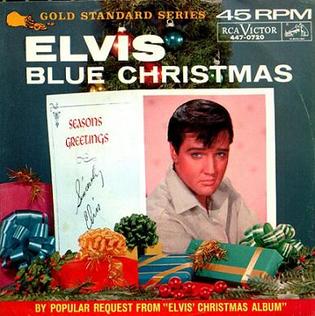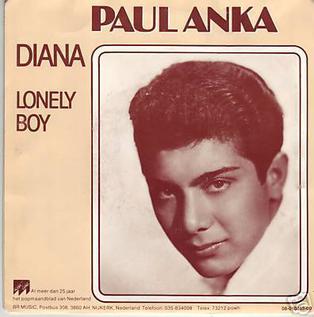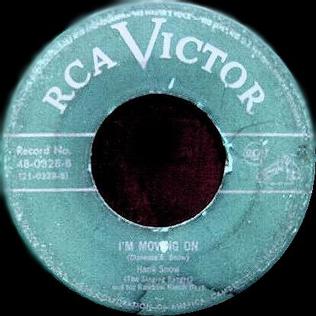Related Research Articles

An extended play record, usually referred to as an EP, is a musical recording that contains more tracks than a single but fewer than an album or LP record. Contemporary EPs generally contain four or five tracks, and are considered "less expensive and time-consuming" for an artist to produce than an album. An EP originally referred to specific types of records other than 78 rpm standard play (SP) and LP, but it is now applied to mid-length CDs and downloads as well.
In the music industry, the Top 40 is the current, 40 most-popular songs in a particular genre. It is the best-selling or most frequently broadcast popular music. Record charts have traditionally consisted of a total of 40 songs. "Top 40" or "contemporary hit radio" is also a radio format. Frequent variants of the Top 40 are the Top 10, Top 20, Top 30, Top 50, Top 75, Top 100 and Top 200.

Clara Ann Fowler, known professionally as Patti Page, was an American singer and actress. Primarily known for pop and country music, she was the top-charting female vocalist and best-selling female artist of the 1950s, selling over 100 million records during a six-decade-long career. She was often introduced as "the Singin' Rage, Miss Patti Page". New York WNEW disc-jockey William B. Williams introduced her as "A Page in my life called Patti".
"Bewitched " is a show tune and popular song from the 1940 Rodgers and Hart musical Pal Joey. It is part of the Great American Songbook. The song was introduced by Vivienne Segal on December 25, 1940, in the Broadway production during Act I, Scene 6, and again in Act II, Scene 4, as a reprise. Segal also sang the song on both the 1950 hit record and in the 1952 Broadway revival. It was performed by Carol Bruce in the 1954 London production.

"Unchained Melody" is a 1955 song with music by Alex North and lyrics by Hy Zaret. North wrote the music as a theme for the prison film Unchained (1955), hence the song title. Todd Duncan sang the vocals for the film soundtrack. It has since become a standard and one of the most recorded songs of the 20th century, most notably by the Righteous Brothers in 1965. According to the song's publishing administrator, over 1,500 recordings of "Unchained Melody" have been made by more than 670 artists, in multiple languages.

"Twist and Shout" is a 1961 song written by Phil Medley and Bert Berns. It was originally recorded by the Top Notes, but it did not become a hit in the record charts until it was reworked by the Isley Brothers in 1962. The song has been covered by several artists, including the Beatles, Salt-N-Pepa, and Chaka Demus & Pliers, who experienced chart success with their versions. The tune was obviously copied from, or at least heavily influenced by, the 1958 Ritchie Valens version of "La Bamba".

"Jailhouse Rock" is a song recorded by American singer Elvis Presley for the film of the same name. It was written by Jerry Leiber and Mike Stoller. RCA Victor released the song on a 45 rpm single on September 24, 1957 as the first single from the film's soundtrack EP. It reached the top of the charts in the U.S. and the top 10 in several other countries. The song has been recognized by the Grammy Hall of Fame, the American Film Institute, and others.
"La Bamba" is a Mexican folk song, originally from the state of Veracruz, also known as "La Bomba". The song is best known from a 1958 adaptation by Ritchie Valens, a Top 40 hit in the U.S. charts. Valens's version is ranked number 345 on Rolling Stone magazine′s list of the 500 Greatest Songs of All Time.

"Candle in the Wind 1997", also known as "Goodbye England's Rose" and "Candle in the Wind '97", is a song by English musician Elton John and songwriter Bernie Taupin, a re-written and re-recorded version of their 1973 song "Candle in the Wind". It was released on 13 September 1997 as a tribute single to Diana, Princess of Wales, with the global proceeds from the song going towards Diana's charities. In many countries, it was pressed as a double A-side with "Something About the Way You Look Tonight". It was produced by Sir George Martin.
Cashbox, also known as Cash Box, was a music industry trade magazine, originally published weekly from July 1942 to November 1996. Ten years after its dissolution, it was revived and now continues as Cashbox Magazine, an online magazine with weekly charts and occasional special print issues. In addition to the music industry, the magazine covered the amusement arcade industry, including jukebox machines and arcade games.

"Here in My Heart" is a popular song written by Pat Genaro, Lou Levinson, and Bill Borrelli, first published in 1952.
"Let It Snow! Let It Snow! Let It Snow!", also known as simply "Let It Snow", is a song written by lyricist Sammy Cahn and composer Jule Styne in July 1945. It was written in Hollywood, California during a heat wave as Cahn and Styne imagined cooler conditions.

"Are You Lonesome Tonight?" is a song written by Roy Turk and Lou Handman in 1926. It was recorded several times in 1927—first by Charles Hart, with successful versions by Vaughn De Leath, Henry Burr, and the duet of Jerry Macy and John Ryan. In 1950 the Blue Barron Orchestra version reached the top twenty on the Billboard's Pop Singles chart.

"Who's Sorry Now?" is a popular song with music written by Ted Snyder and lyrics by Bert Kalmar and Harry Ruby. It was published in 1923, when Isham Jones had a major hit with it. Other popular versions in 1923 were by Marion Harris, Original Memphis Five, Lewis James, and Irving Kaufman.

"Blue Christmas" is a Christmas song written by Billy Hayes and Jay W. Johnson and most famously performed by Elvis Presley; it was first recorded by Doye O'Dell in 1948. It is a tale of unrequited love during the holidays and is a longstanding staple of Christmas music, especially in the country genre.

"Diana" is a song written and first performed by Paul Anka, who recorded it in May 1957 at Don Costa’s studio in New York City. Anka stated in his autobiography that the song was inspired by a girl named Diana Ayoub, whom he had met at his church and community events, and had developed a crush on. Session musicians on the record included Bucky Pizzarelli on guitar, Irving Wexler on piano, Jerry Bruno on bass, and Panama Francis on drums. The song was recorded in May 1957 at RCA Studios in New York. Backup singers included Artie Ripp.
"It's Just a Matter of Time" is a popular song written by Brook Benton, Clyde Otis, and Belford Hendricks. The original recording by Benton topped the Billboard Hot R&B Sides chart in 1959 and peaked at No. 3 on the Hot 100 pop chart, the first in a string of hits for Benton that ran through 1970.

"I'm Moving On" is a 1950 country standard written by Hank Snow. It is Snow's most recorded song.